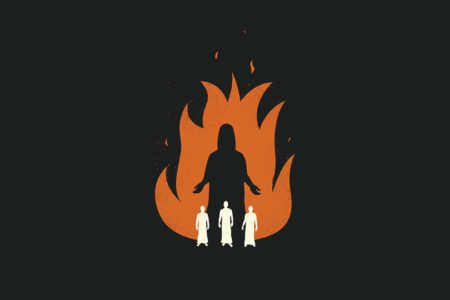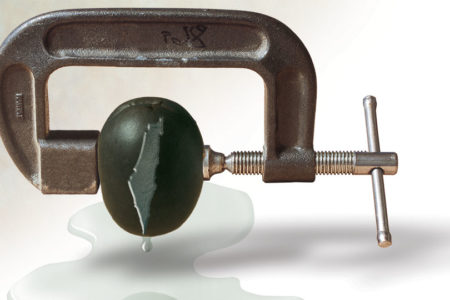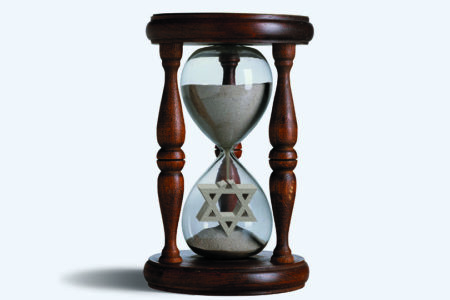Jewish Humor
The obstetrician wanted to be sure. His patient had told him the date she expected her baby to be born. Taking into account her age, size, and weight gain, the doctor felt it prudent to get more accurate information. “Report to the radiologist for an ultrasound,” he told her. “Then we’ll see what’s what.”
So accompanied by her husband, she reported to the radiologist. During the procedure the technician asked, “Why did the doctor have you come here?” The woman explained the reasons.
Meanwhile, the husband was occupying himself by looking at the little screen filled with indiscernible images. The technician calmly pointed out a blinking light that indicated the beating heart of the unborn baby. Then suddenly, without warning, the technician blurted out, “There are two babies here!”
The couple shouted back, “Two babies!” The mother burst into tears, and the father laughed hysterically.
I know the story well, because I am the father of those two babies. My reaction to the announcement of my twins more than fifteen years ago was probably similar to that of Abraham’s wife Sarah thousands of years earlier. At that time she had heard the prophecy that she would bear a son (Gen. 18). She certainly must have said to herself, “at my age, from a husband as old as my Abraham?” Her reaction, like Abraham?” Her reaction, like mine, was to laugh in disbelief. But it was not a joke, and a year later she named her newborn son Isaac, which means “laughter” in Hebrew—a clear reminder of his miracle conception. Interesting that one of our revered patriarchs was named Laughter.
It has been said that comedy is contrived; humor is lived. Humor can unquestionably relieve tension and stress. No doubt, that is why Abraham’s wife and I both laughed, demonstrating God’s wonderful gift of humor.
Webster’s Dictionary defines humor as “something that is, or is designed to be, comical or amusing, that quality which appeals to a sense of the ludicrous or absurdly incongruous.” In that context, God’s Word is filled with humor. In fact, the Hebrew Bible mentions laughter (zehok) fifty times.1 Depending upon the context, the word is translated as “play, enjoy, insult, mock, rejoice,” and “scoff.”
One cannot help but laugh when picturing the account of the prophet Elijah’s meeting with the false prophets of Baal in 1 Kings 18:27. Elijah shouts to them, “Cry aloud; for he is a god. Either he is talking, or he is pursuing, or he is in a journey, or, perhaps, he sleepeth, and must be awakened.” Today we could rephrase that something like this: “Why isn’t your god doing anything? Oh, I get it. He’s on the phone. Or maybe he’s on vacation!”
Equally as comical is the narrative in Numbers 22:28: “And the LORD opened the mouth of the ass, and she said unto Balaam, What have I done unto thee, that thou hast smitten me these three times?” Even funnier is the next verse. Balaam answers her!
Consider these from the book of Proverbs: “As a jewel of gold in a swine’s snout, so is a fair woman who is without discretion” (11:22); “It is better to dwell in a corner of the housetop, than with a brawling woman in a wide house” (21:9); “It is better to dwell in the wilderness, than with a contentious and an angry woman” (21:19); “A slothful man hideth his hand in his dish, and will not so much as bring it to his mouth again” (19:24); “The slothful man saith, There is a lion outside; I shall be slain in the streets” (22:13).
Clearly, God has stamped His sense of humor within the pages of His Word. And it is just as clear that He has infused it into His Chosen People as well. Jewish humor takes the definition of humor and narrows it to something comical or amusing created by Jews, about Jews, and reflecting the lives of Jews. In fact, the amusing verses from Proverbs clearly constitute Jewish humor, encompassing all three of these characteristics.
In the Big Book of Jewish Humor, editors William Novak and Moshe Waldoks define a Jewish joke as “one that no goy [Gentile] can understand and every Jew says he has already heard.” As an example, they offer this old, yet timeless tidbit: “They say that when you tell a joke to a peasant, he laughs three times—once when you tell the joke, again when you explain it, and yet again when he understands it, for the peasants love to laugh.
“When you tell a joke to a landowner, he laughs twice—once when you tell him the joke, and again when you explain it, for he never really understands it.
“When you tell a joke to an army officer, he laughs only once—when you tell it. He never lets you explain it, and it goes without saying that he is unable to understand it. “But when you tell a joke to a Jew—even before you’ve had a chance to finish it, he’s already interrupting you. First, he’s heard it before. Second, why are you telling it wrong? So he decides to tell you the joke—but in a much better version than yours.”2
Jewish humor is always about something. That something can be food, business, family, anti-Semitism, health, wealth, or survival. Here are some examples: An elderly Jewish man is struck by a car and brought to the hospital. A pretty nurse tucks him into bed and asks, “Mr. Shapiro, are you comfortable?”
Shapiro replies, “I make a nice living.”
A Jewish boy comes home from school and tells his mother he’s been given a part in the school play. “Wonderful!” she says. “What part is it?”
The boy says, “I play the part of the Jewish husband.”
The mother scowls and says, “Go back and tell the teacher you want a speaking part.”
Jewish humor is often quick and biting. You can easily miss it if you’re not really listening. What did the waiter ask the group of dining Jewish mothers? “Is anything all right?”
A man who dies asks that his ashes be scattered over Bloomingdale’s so that his wife will visit once in a while.
It can be sarcastic, complaining, resigned, or descriptive. “Sam, please close the window. It’s cold outside.”
Sam says, “So, and if I close the window, will it be warm outside?”
A classified ad reads, “Orthodox psychologist who knows how to live well, seeks woman to share bleeding ulcer.”3
Sometimes the point of the humor is more powerful than the laugh it might deliver. In fact, the appropriate response might not be laughter at all. Instead, a simple nod or a sigh is all that is needed. Cohen and Katz used to play cards every day in a coffeehouse. One day they quarreled and Katz called out, “What kind of guy can you be if you sit down every day to play cards with a guy who sits down to play cards with a guy like you?”
Dr. Avner Ziv is chairman of the Tel Aviv University Department of Educational Sciences in Tel Aviv, Israel. In 1986 he chaired a conference that was attended by academics and comedians to examine Jewish humor. Dr. Ziv made this statement: “Jews, with their long history of pogroms, persecutions and killings, have developed a sense of humor known around the world—that is one of the few positive stereotypes about us.”4
Indeed, just as Jewish music often takes a minor key—a reminder of the suffering that has framed the Jewish experience—so Jewish humor uses quick wit, self-deprecation, mocking, and biting sarcasm to cope with a seemingly ever-present heartache.
Shalom Aleichem (1859-1916) was inarguably the greatest humorist in all of Jewish literature. His most famous of writings was used to bring to Broadway and to the big screen the bittersweet musical Fiddler on the Roof. In an early scene, the Jews gather around their beloved rabbi in the village of Ana Tevka. “Rabbi,” one of the citizens cries, “is there a proper blessing for the Czar?”
The rabbi strokes his beard and responds, “May God bless and keep the Czar—far away from us!”
This kind of writing epitomized the Talmudic dictum, “Tears of sadness are bad tears, tears of laughter are beautiful” (Shab. 151b-152a). They depict the hard life the Jewish people have had to live.
The works of Shalom Aleichem, more than any other, epitomize the Jewish people’s desire to survive. He depicted Jewish society during a time of transition—a time between the old style of Eastern Europe and the advent into modern culture. He communicated with uncanny ability the Jewish struggle just to live and the incredible ability of the Jewish people to adapt to the new situations forced upon them. His characters faced death, shattered dreams, madness, and disintegration. Yet he always countered these tragedies of life with enthusiasm and humor.5
Tevye the milkman, in the Fiddler story, talks to God on many occasions. He wonders why he is not rich, noting, “It is no shame to be poor. But it’s no great honor either!” In another situation, he makes this comment to God, “You help complete strangers—why not me?”
The freedom and opportunity found in America made life for the Jews much easier than the old days of Europe. Jewish humor rose in prominence as Jewish people from New York cooled themselves in the summer in what became known as the “borsht belt” of the Catskill and Pocono Mountains. Jewish people laughed at themselves as they identified with the hilarious tales told masterfully by a generation of Jewish storytellers. It was here that comedians such as Sid Caesar and Danny Kaye honed their skills so well that their names became known both in Jewish and Gentile households around the country.
Other well-known Jewish comedians, such as Jack Benny, George Burns, Alan King, and the Marx brothers built their reputations by relating common, everyday situations in such a way as to elicit a smile and a laugh.
Jewish people have made it so easy for us to laugh at ourselves. And they certainly have shown they can laugh at themselves as well.
Yet as funny as those stories and jokes might be, they are only funny—or even acceptable, for that matter—when told by a person of the same background. Please, if you are not Jewish, don’t tell your Jewish friend a demeaning “Jewish joke.” It may be funny coming from a Jewish person, but it can be extremely offensive coming from a non-Jewish person.
In her book Bar Mitzvah, Sarah Silberstein Swartz says, “It is said that true Jewish humor mirrors the history of the Jewish people— their joys and tragedies, their aspirations and discouragements, their values.”6 Sometimes things hurt so much we just have to laugh. Perhaps that is why God says in His Book, the Bible, that “A merry heart doeth good like a medicine” (Prov. 17:22). And I think that is a good thing.








1 thought on “Jewish Humor”